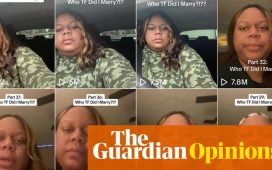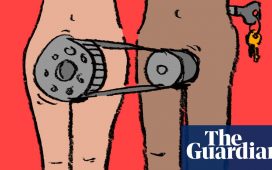I want to talk to Mark Manson about intimacy, a recurring theme throughout the blogger-turned-author’s new Audible Original audiobook, Love is Not Enough. However, the three publicists listening in on our call (another sent her apologies) are killing my vibe. I’m not sure if they’re here because of tightened security, put down to Manson’s obscene level of authorial success (his 2016 book The Subtle Art of Not Giving a F*ck has sold more than 10 million copies) or if everyone is so enthralled by his wisdom that to sit in is an opportunity too good to pass up.
“Thank you all for gathering,” says one. And also, “Pretend like we’re not even here.”
Maybe it’s a deliberate and ingenious metaphor for the blockages that we install in our romantic relationships. After all, the five interviewees that populate Manson’s audiobook have a habit of seeking out shadowy partners – be they adulterous, narcissistic or just remote – or they fantasise or self-medicate themselves to a safe distance.
It’s Manson’s mission to reach those who are terrified of intimacy, but who are turned cold by traditional self-help speak; hence his penchant for tough-love titles. Like that of The Subtle Art of Not Giving a F*ck. Its hi-vis orange cover was hardly necessary – the book seemed to be the most popular accessory of the year. The 2019 follow-up, Everything is F*cked: A Book About Hope, was packed with the same kind of no-frills insights.
The Love is Not Enough audiobook is a return to older territory. Manson started his brand almost by accident in his 20s, when – inspired by Neil Strauss’s 2005 book The Game: Penetrating the Secret Society of Pickup Artists – he started posting tips on PUA (that’s pickup artist) forums. Finding popularity in that, he moved into dating coaching through the site Practical Pickup.
“The online life coaching was a new, exciting thing that was happening on the internet,” he tells Guardian Australia. “I was a young single guy, and so most of the people I was working with were young single people. It really wasn’t until I got older and the audience got bigger that the scope of work expanded into relationships and marriages.”
In 2010, after five years in the PUA space – which was increasingly getting a reputation for misogyny and even inciting violence against women – Manson made a public exit, and posted on his website a critique of The Game. He self-published the book Models: Attract Women Through Honesty in 2011, then pivoted into more general life guidance for men with the site Post Masculine.
So Manson got out early – and gracefully. A few years later, the more controversial PUA organisation Real Social Dynamics followed suit by deleting much of its pickup material and moving into self-development, but not before founder Julien Blanc had his Australian visa revoked by Scott Morrison after outcry at footage of him grabbing nonconsenting women. And by 2015, Strauss had written The Truth: An Uncomfortable Book About Relationships, telling the Guardian that he felt “a healthy sense of shame” about The Game.
When asked if his change of heart was a 180 or natural evolution, Manson says, “Early on, when I was writing dating advice, I was frustrated because I kept running up against the pickup artist stuff. I kept talking to these young guys who had read The Game and these other books, and were just going out and saying and doing the stupidest things. Finally, at some point, a bunch of people told me ‘You need to write the antidote to The Game’. And so that’s that’s where my self-published book came from.”
But the big transition didn’t come until 2013, when Manson came to the conclusion that he was repeating himself and not digging deep enough.
“I realised that relationship problems don’t happen in a vacuum,” he says. “You don’t start dating a married man out of nowhere; there are self-esteem issues, there are identity issues, there are deep insecurities that translate over into other parts of your life. I wanted to start writing about psychology and personal development more broadly.”

He moved his business over to a self-titled, gender-neutral site. Three of his five interviewees in the audiobook are women. One, “Vanessa”, he has alluded to already. She’s a successful businesswoman seeing a married man. Vanessa’s voice shakes in her interviews, maybe because the admission of an affair tends to whip up storms of incomparable outrage (as comments in response to letters received by the Guardian’s advice columnist Mariella Frostrup will testify). But Manson joins the ranks of therapist Esther Perel, who wrote The State of Affairs: Rethinking Infidelity and author Wednesday Martin, who wrote Untrue, in tackling the topic analytically.
“I was very conscious that you can’t help somebody if you’re judging them,” he says, “and I genuinely believe that the awful things we do in our relationships, we don’t do them because we’re evil or mean, we do them because we’re scared or hurt.”
Thus he sees his role as getting to the bottom of that. We can hear the interviewees keen to discuss the minutiae of a situation, as if this is where the mystery lies. Instead, Manson dives beneath the surface, into the murkier waters of values, boundaries and fears. Sometimes, as he says, the stories wind up resolved and tied up in a neat bow; sometimes not.
Manson allows some transparency about his own life; in his books, in interviews, and also in his live shows, in which he’ll perch informally on the edge of a stage, or sit cross-legged. He’s avoided the cultivated guru look of a self-help star like Russell Brand; no beards or beads here. In any case, Neil Strauss defined that as “peacocking” – wearing something outlandish to set you apart and provide an interesting talking point – which wouldn’t do at all.
Even so, I wonder how he avoids en masse “transference” – the Freudian term for when someone projects their feelings for a parent on to their therapist.
“People have this sense that they know me, like they’re friends with me, so it’s more like hanging around after the show and trying to go get a drink with me, or asking what hotel I’m staying at and if I want to hang out,” he says. “One thing I’ve had to learn throughout my career is to manage that relationship with my audience and set boundaries. So I am transparent with the public [in that] I am willing to talk about my life, but also I’ve learned the lines that I won’t cross.”
As we wind up, I mention the unavoidable fact that we’re going through a global transition period, a time forcing us to accept and adapt. In The Subtle Art of Not Giving a F*ck, Manson wrote that everything positive has some associated sacrifice or cost. But might we feel under undue pressure to have some earth-shattering epiphany about our lives right now?
“I think epiphanies are overrated,” he says. “I think most of our important life changes are actually just a series of tiny 1% changes that compound over time. And then, instead of recognising all of the little decisions that added up to the big change, we just look back and invent the story for ourselves: oh yeah, it was that one time where my dad got in the car accident that changed everything. And that’s very rarely the case.”
• Love is Not Enough by Mark Manson is out now through Audible Originals














